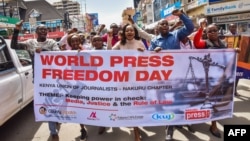No country in East Africa ranks high in the World Press Freedom Index, prepared each year by advocacy group Reporters Without Borders. But journalists in the region tend to congregate in Kenya. Violations of press freedom do happen there, but journalists say the country provides a relatively safe haven for their work.
The 2019 World Press Freedom Index ranks Kenya 100th out of 180, with a score of 32.44 in press freedom. The position marks a drop of four spots compared to the country’s previous ranking.
The report signals a steady decline in media freedom in Kenya over the years, and blames the political situation and security concerns for restrictions on journalists.
Kenya, however, has for decades performed better than its East African neighbors, providing a safe haven and operating base for reporters from the region fleeing threats in their home countries.
In March, Burundi banned the BBC and indefinitely suspended VOA broadcasts, alleging they spread falsehoods.
Eloge Kaneza, a Burundian freelance journalist working with VOA, has been reporting on Burundi from Kenya for a year. He says Kenya has provided a safe space for journalists like him.
“Being [on the] outside I am allowed to talk to sources on the ground. You see, there is a difference because the government now decided that all journalists - foreigners and Burundians themselves - cannot work for VOA and BBC at this moment. For me being in Kenya, I have more access to sources than those in Burundi," said Kaneza.
In Africa, war-torn Somalia remains the most dangerous country to be a journalist.
Ahmed Aden, a journalist who works in Somalia but has a base in Kenya, says many Somali journalists are exiles because of death threats at home. While attacks targeting journalists are down, he says, reporters often are injured in al-Shabab militant attacks in Mogadishu.
“With the latest such a victim being popular Somali journalist Awil Dihar Salad from the U.K. We also have another Somali journalist who returned from Kampala, Mohammed Rage, who was also killed after having returned to Somalia. So I think it’s not the right time for exiled Somali journalists to return, given the situation we have in Somalia and that the government has not created an enabling environment for them to work,” Aden said.
Victor Bwire, the deputy chief executive officer and programs manager at the Media Council of Kenya, says Kenya still has too many restrictions on journalists but has earned its comparatively high ranking in the Press Freedom Index.
“We are saying Kenya is better. From our thinking it is a better environment for journalists to work but there are a few things that need to be sorted out. But averagely (on average), press freedom in Kenya is better than [elsewhere] in the region,” Bwire said.
Both Tanzania and Uganda dropped in the latest rankings. The Index notes that Tanzania's government suspended The Citizen newspaper for a week last February after it published a story on the depreciation of the Tanzanian shilling.
It says Uganda last year undermined press freedom by introducing a daily tax on the use of social networks, the first restriction of its kind in Africa.




